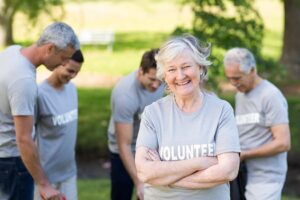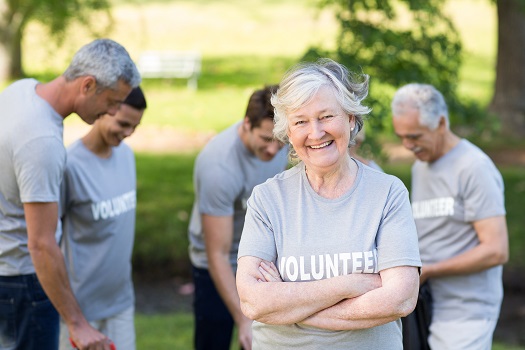
It is easy to see how maintaining an active social life is good for your health, but new studies reveal that staying connected through volunteering can actually reduce the effects of aging. By specifically improving self-esteem and self-confidence, volunteering can help reduce heart rates and blood pressure, increase endorphin production and enhance the immune system.
Volunteering has also been shown to alleviate stress, lessen insomnia and hasten surgery recovery time. Studies show that helping others results in an overall heightened sense of well-being, which has countless positive effects on health.
Bruce Linton, a psychologist at the University of California at Berkeley, believes that the benefits of volunteering should be obvious since we are such social beings; it makes sense that meaningful relationships, being productive and keeping active are vital to healthy aging.
“By volunteering and helping others, we’re able to enjoy the greatest of all human pleasures: caring for others and being cared about,” Linton says. By allowing ourselves to experience close interpersonal relationships, volunteering can help strengthen our own sense of identity and enhance our social support network. People with these strong social bonds have lower premature death rates, less heart disease and lower risks of a multitude of illnesses.
With all these health benefits, it is an easy step to see how volunteer work can increase longevity. Researchers at the University of Michigan found a remarkable link between volunteering and longevity by surveying more than 1,200 adults over age 65 in 1986 and reassessing them six years later. Those who volunteered at least 40 hours each year to a single cause were 40 percent more likely to be alive at the end of the study.
More recent studies have shown that those who volunteer a minimum of 14 hours a week live five years longer than those who do not. Interestingly, volunteers who spread their time among several organizations did not gain an advantage in longevity. This could indicate that there is a health benefit to having a singular passion and commitment to a specific cause.
The recession has led to a marked reduction in donations to many charities, and the need for volunteers is greater than ever. Though reduced financial security may mean that baby boomers will work longer and be less available for charitable work, research done by AARP shows that working individuals are just as likely to volunteer for the same or more hours than retirees.
As baby boomers reach retirement age and beyond, this generation has the potential to become a huge force for community endeavors. Fully half of all baby boomers already volunteer and give money to charitable causes, most frequently to Alzheimer’s disease, social services, the environment and the military.
Although the need for volunteers has never been so great, the quality of the volunteering is equally important. Volunteering should be a meaningful and valuable experience. Baby boomers are not likely to settle for licking stamps or answering phones. Rather, the experience, expertise and attitude of baby boomers make them valuable contributors to any organization.
Remember that all of us — irrespective of our financial status, sex or ethnicity — will require help at some point of our lives. Today, you may be the one with the time and skills, but tomorrow you may be the beneficiary of someone else’s volunteer efforts.
Put your assets to work by tutoring at a public school, working at a food bank or campaigning for a cause. Choose activities and groups that fit your health and schedule, and most importantly, volunteer for an organization with a cause you are passionate about. If you have the time to spare, someone can use your talents.
So often we remind young people of the importance of volunteering, but there is no age requirement for community involvement. It is never too early or too late to become a meaningful volunteer. Not only will it provide you an unparalleled outlet for community support, but it can also have an amazing effect on your health.
Dr. David Lipschitz is the author of the book Breaking the Rules of Aging.
 Related Articles & Free Subscription
Related Articles & Free Subscription
How Dating Can Work in Retirement







Comment here